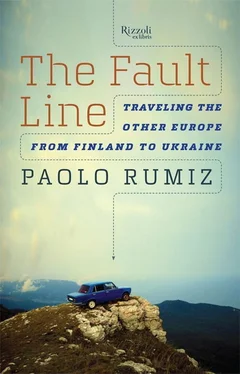Iosip, Georgian taxi driver: “This is my second fatherland. I came here twenty years ago, and it was all gray. Today, it’s upbeat, and above all, there’s no risk of war. Life is good. And tell me, where is it written that the frontier is a downer?”
No-man’s-land, a rarefied space of the imagination, Kaliningrad is a fantastic nonplace like Trieste and Odessa, a city of illusions and intrigues, comparable to postwar Vienna, an ideal setting for Bogart films. Maybe to understand the city—its billionaire smugglers and its pockets of poverty, its military installations and its depressive psychoses—you really do need the philosophy of Kant, the man who, without knowing it, laid the groundwork for modern psychiatry, sanctioning the unknowability of reality with his historic distinction between “das Ding für mich” and “das Ding für sich,” the thing as it appears to me and the thing in itself.
“Who knows what the German thinker would say about the Russified Königsberg of today?” The city’s postmodern intellectual circles amuse themselves with such questions. When the Russians routed Prussia and occupied the Baltic port from 1758 to 1762, Professor K didn’t have a bad time of it. The man by whose afternoon walks the city set its clocks turned out to be an accomplished dispenser of salon witticisms and an excellent pool player, and thanks to the czar of Saint Petersburg, he even had an academic career. The historian Manfred Kühn recalls that Kant greeted with pleasure the new Slavic air that had enlivened the small Prussian world, too methodical and predictable, too dour-faced from Protestant piety and regimented by a dynasty of sergeant-kings.
We have an appointment with Kristina and her girlfriends at the Plaza shopping center, a concrete and glass giant surveilled by more gorillas, not far from the Prussian cathedral rebuilt with German capital. The terrace restaurant is pure America: boom-boom music, giant screens with soccer games, a vacuous horror dripping even from the hyperdecorated walls of the restrooms, vocal communication absolutely impossible without shouting. A friend of Kristina’s explains that the punitive system of the Lithuanian visas discriminates against the poor, who cannot afford to fly. “And if we go from Moscow to Kaliningrad carrying Russian medicines, the Lithuanians seize them because, they say, they’re not in conformity with the regulations. They consider them addiction-inducing narcotics. But it’s just plain old protectionism. In Klaipėda, there was a nice market for Russian medicines; today there’s nothing.”
When I go out onto the terrace to get a breath of fresh air and enjoy the view of the boulevards and the former Palace of the Soviet, now an abandoned ghost, the waiter runs out to get me because staying outside is prohibited. It seems that one day someone was thrown off the terrace to the ground below. I escape again to people-watch. On a tram, I encounter a Mongol woman of breathtaking beauty and a troubled-eyed Slav with a braid as thick as a rope. On a bus, there’s a Georgian gang that ogles my notebook and forces me into an escape in English.
At the zoo, guarded by two matrons at the ticket booth, I’m left bewildered, watching a clearly crazed sea lion swimming in an undersize pool, not far from a melancholy giraffe, immobile under the Northern sky.
Leopold Baranowski, ex-submarine officer in charge of the torpedoes, takes me to visit the B-413 submarine parked at the dock. He traveled underwater for more than twenty years, from 1960 to 1982, in all the seas of the world. “I’ve seen your hometown, too, through the periscope,” he says to me about Trieste.
“Your defenses were excellent,” he continues, but complains that Western films about Russian submarines are all nonsense. “Even the Russian films are all lies. The only realistic one that I’ve seen is German, entitled Das Boot .” I ask him how long he used to go without seeing the sunlight. “Up to six months.” How did you do it? “Today, I ask myself that same question.” While we’re in the wardroom, two steps away from the periscope, we hear a ticking sound like a pounding rain that takes possession of the hull. “It’s nothing,” Leopold smiles, “it’s just another ship passing nearby.” Kaliningrad by itself is worth a journey.
In the square with the monument to the fallen of 1941–45, there’s Andrei, twenty-two, just named midshipman, in a white uniform and dress sword, who waves a bunch of fuchsia-colored flowers in our faces to invite us to drink shampanskoye with his friends. He has just disembarked in Murmansk from the missile launcher Peter the Great , where he put his studies of ballistics to use, and he is celebrating his promotion with a group of young aspiring officers. I tell him that I have a son by the same name. Then I add that my father was also an officer. Right away he asks me if my father fought on Hitler’s side, a question that is as naive as you like, but unavoidable. “ Da ,” I reply. Yes. “Sometimes,” I explain, “it happens that you fight on the wrong side. But he was an officer and a gentleman. And in any case, he was a good father.”
Sorry to have embarrassed me, the young man in uniform whispers sweetly, “I understand.” Then he raises his glass again and proclaims to his friends, to us, to the city: “I love you. I love you, and I carry you in my heart.” I’m not sure any Western soldier would say something like that, especially in the presence of strangers. Meanwhile, at the base at Baltiysk, eighteen miles from the city, on this side of the big sand dune that closes the Baltic, Putin’s nuclear submarines, lined up like glistening mackerel on a fish stand, put the West on notice that the Bear never sleeps.
I’ve already talked about the marvel of Russian trains, the small strawberry- or pistachio-colored stations where they stop in the middle of the forest, their steaming samovars, the original geometry of their bunks, and the endless, orderly picnics that are consumed on board long-distance runs under the watchful eyes of a maternal hostess who takes everyone and everything under her wing.
What I haven’t mentioned yet is the magnificence of their tickets, decorated like banknotes, solemnly titled Travel Document, sheathed in a multicolored sleeve, perfect souvenirs with your revered name in Cyrillic, departure and arrival times, your passport number, and a plethora of data that make them irreplaceable documents of your life. Nothing can compare to them except perhaps the stamps applied to your visa. They are so baroquely beautiful that I have gathered them all in a case, which I keep in the stationery compartment of my pack. The ticket purchased for the ride from Petrozavodsk to Saint Petersburg–Ladozkaya, along the border strip with Finland, is a light primrose pink, with a pompous script RELEASE near the top in perfectly matched brown Cyrillic, and on the lower right, the signature of the ticket vendor, rich with Victorian swirls. The route from Olenegorsk to Kyem, the embarcadero for the Solovetsky Islands, is represented by a prune-colored card with flaming red decorations, and on the left a golden yellow icon, like a coin, bearing an image of the locomotive of the new Russia, racing toward the future. The sleeve of the tickets issued at the central station in Kaliningrad features a map of Russia with a radiant sun in the center, and it changes color progressively from one side to the other with all the shades of the rainbow. It’s as though all the pride of the nation were concentrated in these pieces of paper.
But the tickets are nothing compared to the ticket booths of the former Soviet empire. In Russia, a ticket vendor—more often than not a woman—is a ranking public official to whom you must address yourself with respect. The people’s deferential attitude in front of a ticket window is one of the most interesting things to be seen around these parts. Already in Murmansk, Olenegorsk, and Saint Petersburg, the lines had taught me a different—much slower—dimension of time, with flexible working hours interrupted by microintervals for union breaks (one every forty-five minutes). But it wasn’t until Kaliningrad that I understood their complex operations.
Читать дальше












